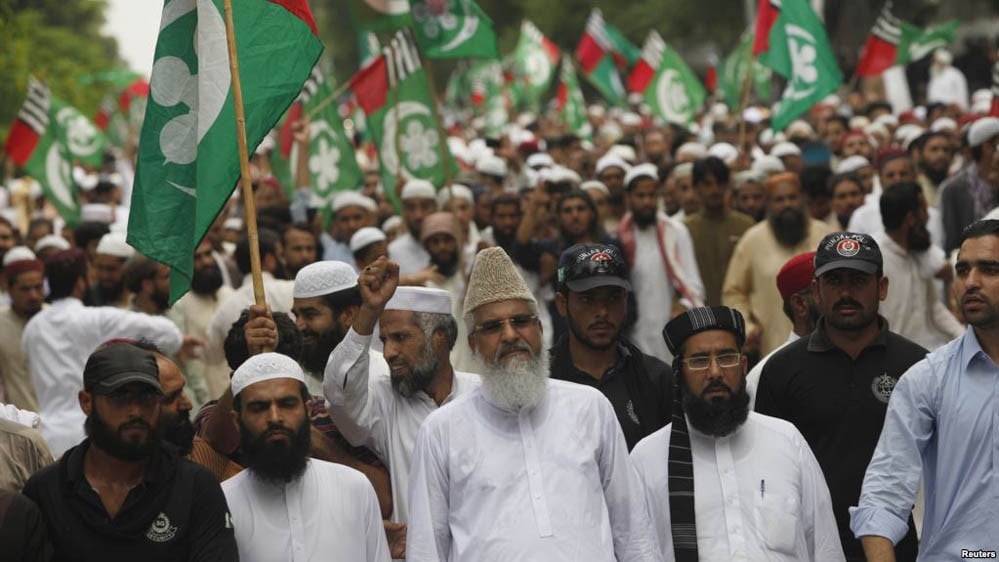
The oft-repeated rhetoric in Pakistan is that religious parties do not get votes. A close look at the results of General Elections 2018 to dispel this myth

The electoral landscape of Pakistan has once again proved fertile for restricted or banned religious groups. Though these banned groups could not bag a huge success, they marked their presence strongly in the 2018 elections by spoiling the vote banks of multiple political and religious parties, mainly Pakistan Peoples’ Party (PPP), Pakistan Muslim League-Nawaz (PML-N) and Muthida Majlis-e-Amal (MMA), reveal analysts and facts.
"Ahle Sunat Wal Jamaat (AWSJ) fielded over 100 candidates across Pakistan for national and provincial assembly seats from the platform of Pakistan Rah-e-Haq Party. Jamaatud Dawa used the name of Allah o Akbar Tehreek and contested for nearly 260 seats for the national and provincial assemblies," says analyst Wajahat Masood.
"Then comes Tehreek-e-Labbaik Pakistan, which is not banned and Sunni Tehrik that is on the watch list. I think the purpose of these groups is quite obvious. They want to create space for themselves in mainstream politics. But the prime target of these groups was to damage the vote bank of PML-N, PPP and MMA," says Masood, adding, "They succeeded."
The most shocking development before the election was the government’s decision to lift its ban on the ASWJ Chief Maulana Ahmed Ludhianavi and to unfreeze his assets on June 27, 2018. He was allowed to contest on NA-89 where he lost against Ghulam Bibi Bharwana of the PTI.
Likewise, Maulana Muavia Azam, son of the assassinated ASWJ Chief Maulana Azam Tariq, also contested for a Punjab Assembly seat from Jhang as an independent candidate and won. Now he has announced support for the PTI, rejecting the PML-N requests for joining it in Punjab.
Another firebrand speaker and central leader of AWSJ, Maulana Aurangzaib Farooqi contested for a Sindh Assembly seat from Karachi and lost despite having ‘strange support’ from PPP and PML-N, media reports say.
When Punjab’s Caretaker Chief Minister Dr Hasan Askari Rizvi was asked about permission to the banned groups, "He said that the caretaker government has nothing to do with these decisions. We just followed the directions of Election Commission of Pakistan for unfreezing Ludhianvi’s assets. The ECP gave permission to these parties to contest elections."
Election2018 witnessed several odd alliances, seat adjustments and intriguing moves by the leaders of banned religious groups.
The PTI leader Asad Umar’s meeting with Maulana Fazlur Rehman Khalil, the chief of Ansar ul Ummah (new name of the banned Harkatul Mujahideen) was another shock to political commentators. Khalil assured Umar of his full support to PTI and told him that he has a strong following in Rawalpindi/Islamabad, KP and Karachi.
Interestingly, Allah-o-Akbar Movement (AAM) a front for Jamaat ud Daawa (JuD) emerged with a different tone in these elections. Despite being a hardline Salafi outfit, the movement selected candidates belonging to various sects and political mindsets throughout the country. For example, they awarded ticket to the widow of Late Jhara Pehlwan, Begum Saira Bano, a Barelvi by belief and cousin of Begum Kulsoom Nawaz, for PP-149 Lahore. To people’s further surprise, the JuD awarded ticket for PP-151 Lahore to a Shia lady, Syeda Tahira Sherazi.
The candidates of AAM bagged over 400,000 votes across Pakistan. But, a spokesman of the JuD, Ahmed Nadeem talks of an even greater mandate and says, "The movement had supported several independent candidates as well and in total got over one million votes."
The AAM went to the extent that it announced support for Ayaz Latif Palejo, a leftist and GDA leader, in Hyderabad.
"We had fielded 260 candidates across Pakistan without any religious or political bias. Seeing our agenda of service to the country and the nation, activists of PPP, PML-N and other regional and religious parties joined us and participated in the election as our candidates," says Nadeem.
He adds, "It was AAM’s first election. Now, we will continue working towards the next election and will give better results."
The JuD’s Chief Hafiz Saeed’s son Talha Saeed and son-in-law Khalid Waleed lost from Sargodha and Lahore respectively from where they were contesting for Punjab Assembly seats.
Tehreek-e-Labbaik Pakistan (TLP) were a new sensation these elections and emerged as the fifth political force in Pakistan in terms of votes. "We have bagged 2.2 million votes according to the election commission’s record but we feel that this number is far less than the actual count," says Ejaz Ashrafi, spokesman of TLP. He adds, "We believe that our success on several seats was blocked through rigging."
TLP won two seats from Karachi, making deep dents in the vote banks of PPP, PML-N, Sunni Tehreek and MQM. "Don’t look at those two seats. Just see, as suggested by studies of research groups, how TLP has added to PML-N’s defeat on 13 seats of the National Assembly, PTI on five seats and PPP on one seat in Lyari where Bilawal Bhutto lost," says Masood.
He said TLP has achieved its targets. "It has established itself as a party and helped block the PML-N ‘s victory in Punjab."
Sunni Tehreek, which is on the watch list, could not make any difference and itself fell victim to the popularity of TLP in Karachi where the Sunni Tehreek’s Chief Maulana Sarwat Qadri lost the election.